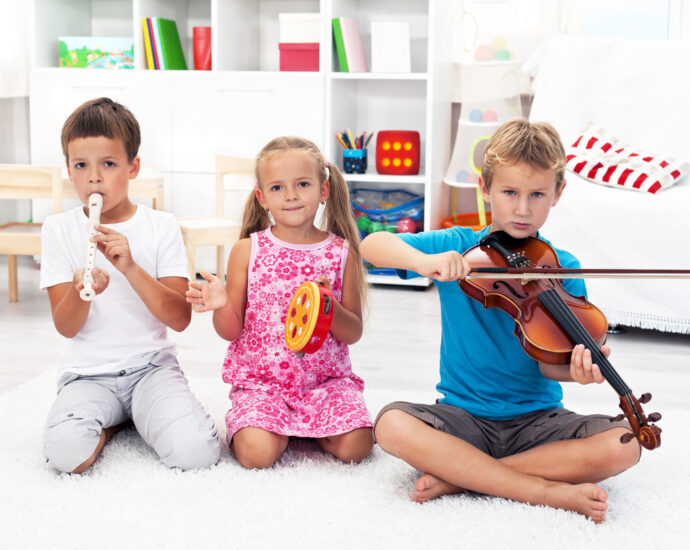Learning to play an instrument is a symphony of benefits that goes well beyond the joy of creating music. The journey of mastering melodies and rhythms offers a harmonious blend of advantages that resonate across various aspects of life. From sharpening cognitive abilities to fostering emotional well-being and building invaluable life skills, the rewards of playing an instrument compose a rich tapestry of benefits that elevate both the mind and soul.
Page Contents
Learning to play a musical instrument isn’t just about mastering melodies; it offers a myriad of benefits that extend beyond the realm of music:
- Enhanced Cognitive Abilities: Playing an instrument engages various parts of the brain, improving memory, attention, and problem-solving skills. It enhances cognitive function and can even boost academic performance, especially in subjects like math and language.
- Improved Motor Skills: Coordinating your hands, fingers, and sometimes even your feet while playing an instrument improves dexterity, fine motor skills, and hand-eye coordination.
- Stress Relief: Music has therapeutic qualities, and playing an instrument can act as a stress reliever. It lowers cortisol levels and triggers the release of endorphins, promoting relaxation and reducing anxiety.
- Boosted Creativity: Engaging with music sparks creativity. Learning an instrument encourages experimentation, improvisation, and the exploration of different sounds and styles, fostering creative thinking.
- Enhanced Discipline and Patience: Mastering an instrument requires dedication and perseverance. It teaches patience, discipline, and the value of consistent practice to achieve goals—a valuable lesson applicable in various aspects of life.
- Increased Confidence: Progressing in musical proficiency builds self-esteem and confidence. Overcoming challenges and mastering new techniques instills a sense of accomplishment and pride.
- Improved Social Skills: Playing an instrument can be a communal activity, whether through group lessons, bands, or performances. It promotes teamwork, communication, and collaboration with others who share similar interests.
- Emotional Expression: Music is a powerful medium for expressing emotions. Learning an instrument enables individuals to convey feelings and emotions through their music, providing an outlet for self-expression.
- Brain Health in Later Years: Studies suggest that playing an instrument can help stave off cognitive decline as individuals age, potentially reducing the risk of conditions like dementia.
- Lifelong Learning: Learning an instrument is a skill that stays with you for life. It encourages a love for learning and opens doors to a lifelong journey of musical exploration and appreciation.
Whether it’s the joy of creating music, the mental stimulation, or the personal growth it fosters, learning to play an instrument offers a wealth of benefits that extend far beyond musical proficiency.
Learning to play a musical instrument offers children a wealth of developmental and lifelong skills that go beyond just creating music:
- Enhanced Academic Performance: Research suggests that children who learn music tend to perform better academically. It helps improve mathematical skills, language development, and overall cognitive abilities.
- Improved Motor Skills: Playing an instrument involves precise movements and coordination, enhancing fine motor skills and hand-eye coordination in children.
- Enhanced Discipline and Patience: Learning an instrument requires regular practice and dedication. Children learn the value of persistence, discipline, and the importance of consistent effort to achieve desired results.
- Boosted Memory and Concentration: Music education involves memorization of notes, rhythms, and patterns, which can improve memory skills. It also enhances concentration and focus.
- Increased Creativity: Music encourages creative thinking and expression. Children learn to explore different sounds, experiment with melodies, and express emotions through music.
- Boost in Self-Esteem and Confidence: As children progress in their musical abilities, they gain a sense of accomplishment, boosting self-esteem and confidence in their capabilities.
- Stress Reduction: Playing music can be a relaxing and stress-relieving activity for children. It offers a way to unwind and express emotions in a positive manner.
- Improved Social Skills: Whether through group lessons, bands, or performances, music brings children together. It promotes teamwork, collaboration, and communication, fostering valuable social skills.
- Cultural and Historical Appreciation: Learning music exposes children to different cultures, traditions, and historical periods through various musical styles and compositions.
- Lifelong Love for Music: Early exposure to music often instills a lifelong passion for and appreciation of music, encouraging children to explore and enjoy music in various forms throughout their lives.
In essence, learning to play a musical instrument not only equips children with musical skills but also nurtures essential life skills that contribute to their holistic development and well-roundedness.
In the orchestra of life, the act of playing an instrument orchestrates a multitude of benefits that reverberate through every facet of our being. Beyond the melodies produced lies a symphony of cognitive sharpening, emotional resonance, and character refinement. From nurturing discipline and resilience to fostering creativity and self-expression, the act of engaging with music paints a masterpiece of lifelong skills and joys. Embracing the journey of learning an instrument isn’t just about creating music; it’s about composing a life rich with harmony, growth, and the enduring beauty of musical expression.
READ MORE: Types Of Sports That Kids Could Try
Sources:
https://healthsurgeon.com/health/music-in-childhood-health-benefits/
https://practicebusiness.co.uk/how-playing-an-instrument-boosts-your-brain-power
https://www.researchgate.net/publication/270220620_Playing_a_Musical_Instrument_as_a_Protective_Factor_against_Dementia_and_Cognitive_Impairment_A_Population-Based_Twin_Study#:~:text=Controlling%20for%20sex%2C%20education%2C%20and,confidence%20interval%200.13%2D0.99%5D).
https://thepianoplaceutah.com/14-ways-learning-music-enhances-life-skills-in-children/#:~:text=Mastering%20a%20musical%20instrument%20boosts,also%20enhances%20their%20self%2Desteem.
